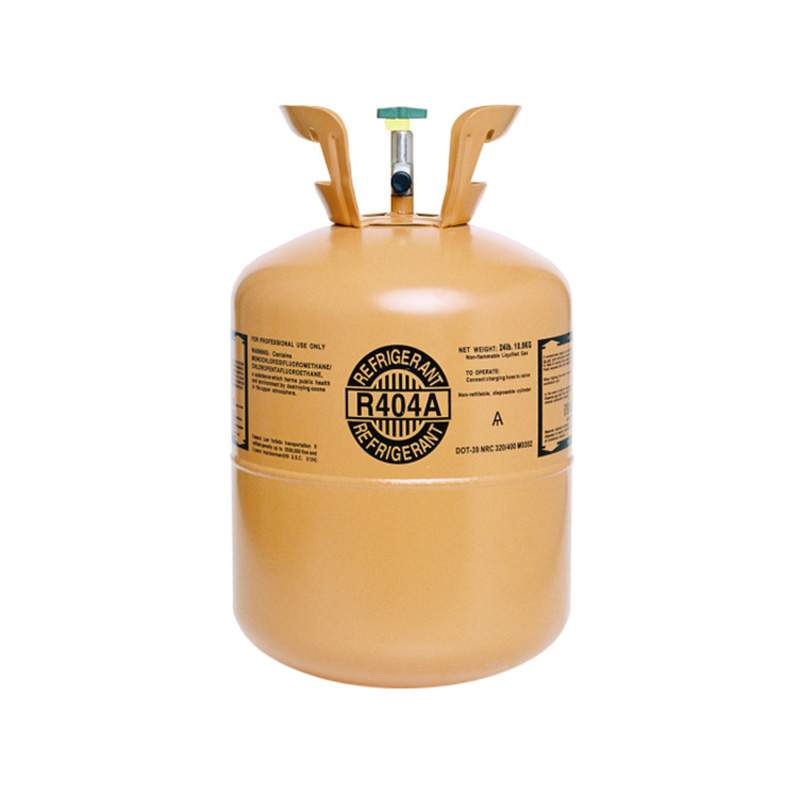APPLICATION
The refrigerant (freon, freon) is used in the working circuits of refrigeration units and air conditioners at low and medium temperatures. The scope of application of freon depends on the physical and chemical characteristics of the mixture.
Refrigerants are used in:
- Chill boxes (industrial, commercial, domestic)
- Freezers (industrial, commercial, domestic)
- Refrigerated vans, car-thermoses, and thermal containers
- Air conditioners (split systems, window air conditioners)
- Industrial air conditioning systems
- Car air conditioners
- Ice production equipment
- Low-temperature industrial equipment
Freon is supplied in non-returnable cylinders of 10.9 kg. Steel cylinders are packed in cardboard boxes. The container holds 1,150 cylinders.
When replacing the refrigerant, it is recommended to install a new filter-dehumidifier.
FEATURES
The refrigerant can consist of 100% freon. However, most refrigerants are mixtures of fluorocarbons (HFCs) and/or chlorofluorocarbons (HCFCs).
For example, R-404A refrigerant contains R-143A (55%), R-125(44%), and R-134A (4%). R-404A is composed only of fluorine-containing gases.
Chlorine-containing freons destroy the ozone layer, and their use is being limited. Since 2010, the import of industrial equipment that uses R-22 is prohibited. Its use is discontinued from 2020. The degree of damage to the ozone layer is characterized by the ODP parameter.
The European and Russian standards recommend the use of refrigerants based on fluorocarbons with zero ODP.
Under normal conditions, freons are chemically inert and non-explosive. Heating above 250°C must be avoided, since the combustion products are toxic.
Freon mixtures can be azeotropic or non-azeotropic. Sometimes near-azeotropic compositions are classified independently.
A refrigeration system that uses a refrigerant whose composition is very different from azeotropic cannot be added in the event of a leak. The volatile component evaporates over time, thus affecting the refrigeration unit performance. In such systems, freon must be replaced completely.
GRADES
| Description | Composition | Properties | Replacement | |
| R-22 | R22, 22 Freon, HCFC-22, chlorodifluoromethane,
Refrigerant 22, HCFC 22, 22 Freon |
100% CF2Cl
|
Ozone depletion potential
(ODP): 0,05 Molecular weight: 86.5g/mol Boiling point at n.c.: -40.8°C Critical temperature: 96.1 Critical pressure: 49.9bar |
R410A, R-404A, R407C,
R507 |
| R-134А | 134A, Freon 134a, R134a, HFC 134A
HFC 134а, tetrafluoroethane
|
100% R-134a 1,1,1,2-tetrafluoroethane (
CF3CH2F)
|
Ozone depletion potential
(ODP): 0 Molecular weight: 102g/mol Boiling point at n.c.: -26,5°С Critical temperature: 101,5°С Critical pressure: 40,7bar |
|
| R-404A | 404A, Freon 404a, R404a, HFC 404A
HFC 404а
|
Near-azeotropic mixture
52% R-143a 1,1-trifluoroethane (CH3CF3) 44% R-125 pentafluoroethane (CHF2CF3) 4% R-134a 1,1,1,2-tetrafluoroethane ( CF3CH2F) |
Ozone depletion potential
(ODP): 0 Molecular weight: 97.6g/mol Boiling point at n.c.: -51,6°С Critical temperature: 72,1°С Critical pressure: 37,3bar |
|
| R-407C | 407C, Freon 407c, R407, R407c, HFC 407C
HFC 407c |
Azeotropic mixture:
23% R-32 1,1-difluorethane (CH2F2) 25% R-125 pentafluoroethane (CHF2CF3) 52% R-134a 1,1,1,2-tetrafluoroethane ( CF3CH2F) |
Ozone depletion potential
(ODP): 0 Molecular weight: 86.2g/mol Boiling point at n.c.: -44,0°С Critical temperature: 86,5°С Critical pressure: 46,0bar |
|
| R-410A | 410A, Freon 410a,
410A, R410A, HFC 410A, ГФУ 410a, Forane
|
Azeotropic mixture
50% R-125 pentafluoroethane (CHF2CF3) 50% R-32 1,1-difluorethane (CH2F2) |
Ozone depletion potential
(ODP): 0 Molecular weight: 72.58g/mol Boiling point at n.c.: -51,3°С Critical temperature: 72,13°С Critical pressure: 49,26bar
|
|
| R-502 | 502, Freon 502, R502, HCFC 502
HCFC 502
|
Azeotropic mixture
48,8% R-22 51,2% R-115 |
Ozone depletion potential
(ODP): 0,33 Molecular weight: 111.6g/mol Boiling point at n.c.: -45,6°С Critical temperature: 72,13°С Critical pressure: 40,1bar |
R-507, R-404A |
| R-507 | 507, Freon 507, R507, HFC 507, ГФУ 507 | Azeotropic mixture
50% R-125 pentafluoroethane (CHF2CF3) 50% R-143a 1,1-trifluoroethane (CH3CF3) |
Ozone depletion potential
(ODP): 0 Molecular weight: 98.9g/mol Boiling point at n.c.: -52,1°С Critical temperature: 70,9°С Critical pressure: 37,94bar |
|
| R-600 | 600, freon 600, R600, R600A, R507, isobutane
|
100% 2-methylpropan (C4H10)
|
Ozone depletion potential
(ODP): 0 Molecular weight: 58.12g/mol Boiling point at n.c.: -11,8°С Critical temperature: -12°С Critical pressure: 36.5bar |
SELECTION
To select a suitable refrigerant, please, leave a request to our specialist.
